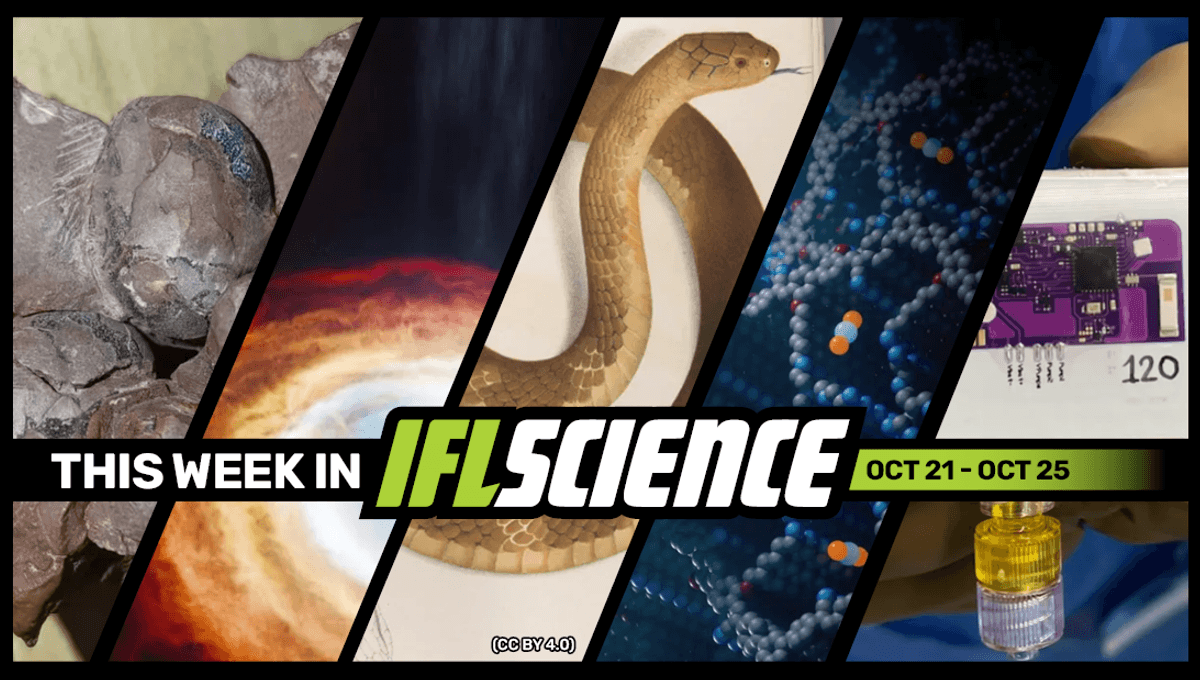
This week, the world’s longest venomous snake, the king cobra, has been found to be four separate species, a new carbon capture design is a major step forward in removing CO2 from the air, and a new implant can detect opioid overdose, give lifesaving drugs, and even call for help. Finally, we ask a psychologist why people believe in ghosts.
Subscribe to the IFLScience newsletter for all the biggest science news delivered straight to your inbox every Wednesday and Saturday.
Smallest Known Complete Dinosaur Eggs Found In China – And Belong To A New Species
Six complete eggs have been found in a partially preserved clutch in the Ganzhou Basin, China, which the discovery team reports are the smallest dinosaur eggs ever found – at least if you don’t count modern birds. Features besides size indicate these are from a different species than any eggs we have seen before. Read the full story here
First “Black Hole Triple” Challenges Models Of How Giant Stars Die
An X-ray binary system composed of a black hole and a star in the process of being consumed turns out to have a third member circling. Unless some unlikely scenarios occurred, the existence of what the discoverers are calling a “black hole triple” indicates a previously unseen method for making black holes. Read the full story here
After 188 Years, The World’s Longest Venomous Snake Is Officially Four Species, Not One
There are always more species to be discovered. Whether it is a bizarre-looking worm lizard or something that has been hidden in a drawer for decades, the implications for naming something new can include helping with conservation as well as other benefits. Now the king cobra has received the same treatment, with researchers putting in the work over many years to discover it’s actually four separate species instead of one. Read the full story here
New Carbon Capture Design Is Major Step Forward In Removing CO2 From The Air
Releasing carbon dioxide and greenhouse gases is easy, but it takes work to capture them again. Removing carbon from the air is a way to reduce the effects of the climate crisis, but a lot of the technology is still at the design stage or is not efficient enough to balance out the emissions. A new approach has been announced that has the potential to make direct carbon capture from air so much simpler. Read the full story here
New Implant Detects Opioid Overdose, Gives Lifesaving Drug, And Even Calls For Help
A small, implantable device that detects a drop in respiration that can signal an opioid overdose and automatically administers the lifesaving drug naloxone – aka Narcan – has been tested successfully in animals. It even has the ability to alert the emergency services, and the researchers say the same kind of technology could be applied to lots of other medical conditions. Read the full story here
TWIS is published weekly on our Linkedin page, join us there for even more content.
Feature of the week:
Why People Believe In Ghosts – A Psychologist Explains All
The belief in ghosts is a funny thing. Despite there being no evidence to support their existence, ghosts have haunted humanity wherever it has settled across the planet. Every age and every culture has its own type of ghost and ghost stories, each shaped by its own peculiar context. And despite the rise of scientific thinking in the 20th and 21st centuries, the belief in unquiet spirits is still very much alive. But why do people still believe in ghosts, and what’s the science behind ghostly encounters? Read the full story here
More content:
Have you seen our e-magazine, CURIOUS? Issue 27 October 2024 is available now. This month we asked, “Why Do We Have Phobias?” – check it out for exclusive interviews, book excerpts, long reads, and more.
PLUS, the We Have Questions podcast – an audio version of our coveted CURIOUS e-magazine column – has begun. In episode 2, we ask “What’s It Like Working In A Human Tissue Bank?”
Season 4 of IFLScience’s The Big Questions podcast continues. So far, we’ve asked:
Source Link: Smallest Known Complete Dinosaur Eggs Found, First “Black Hole Triple” Challenges Models Of How Giant Stars Die, And Much More This Week